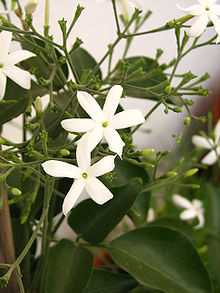Jasminum azoricum
| Jasminum azoricum | |
|---|---|
 | |
| Conservation status | |
| Scientific classification | |
| Kingdom: | Plantae |
| (unranked): | Angiosperms |
| (unranked): | Eudicots |
| (unranked): | Asterids |
| Order: | Lamiales |
| Family: | Oleaceae |
| Genus: | Jasminum |
| Species: | J. azoricum |
| Binomial name | |
| Jasminum azoricum L. | |
Jasminum azoricum, commonly known as lemon-scented jasmine, is an evergreen twining vine native to the Portuguese island Madeira.[2][3][4] The compound leaves consist of 3 bright green leaflets.[2] The fragrant white star-shaped flowers appear in panicles from the leaf axils in summer, evolving from deep pink buds.[2][5]
The species is critically endangered in its native Madeira. Reports of remaining populations vary between 6 and 50 individual plants in two separate areas, Funchal and Ribeira Brava.[1]
Jasminum azoricum has long been in cultivation in Europe as a greenhouse plant with records in Netherlands since 1693 and England from about 1724.[5] It has been prized for its bright evergreen foliage, long flowering period and scented blooms.[5] Plants are readily propagated from cuttings and by layering.[5] The species prefers a sunny, frost-free position with support from structures such as fences or posts.[2]
References
- ↑ 1.0 1.1 Fernandes, F. (2012). "Jasminum azoricum". IUCN Red List of Threatened Species. Version 2012.2. International Union for Conservation of Nature. Retrieved 8 January 2013.
- ↑ 2.0 2.1 2.2 2.3 R. G. Turner, Jr.; Ernie Wasson, ed. (1999). Botanica: The Illustrated A-Z of Over 10,000 garden plants (3 ed.). Barnes and Noble inc. p. 488. ISBN 0760716420.
- ↑ "Taxon: Jasminum azoricum L.". Germplasm Resources Information Network (GRIN). United States Department of Agriculture, Agricultural Research Service, Beltsville Area. Retrieved 8 January 2013.
- ↑ "'Jasminum azoricum L.". The Plant List; Version 1. (published on the internet). 2010. Retrieved 6 January 2013.
- ↑ 5.0 5.1 5.2 5.3 Sydenham Teast Edwards; John Lindley (1815). The Botanical Register: Consisting of Coloured Figures of Exotic Plants Cultivated in British Gardens with Their History and Mode of Treatment. pp. 92–. Retrieved 8 January 2013.
| Wikimedia Commons has media related to Jasminum azoricum. |